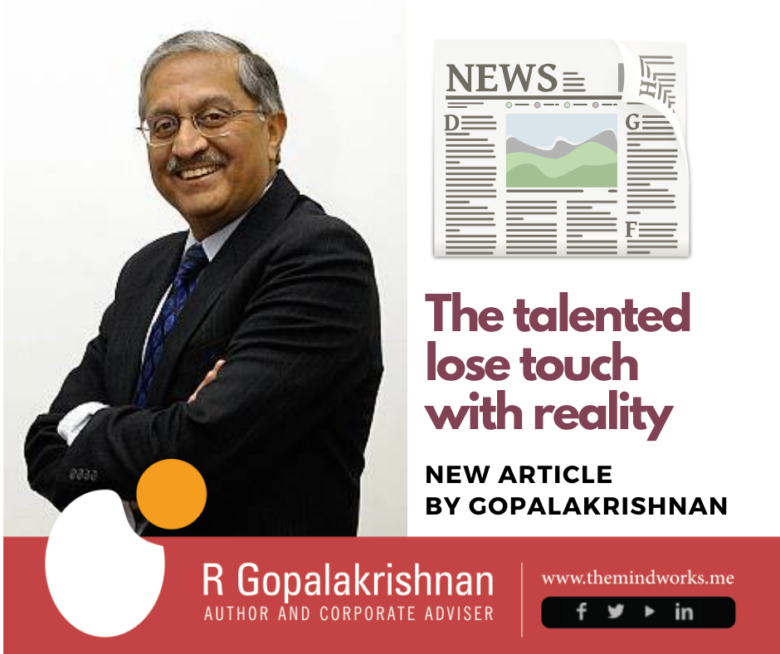Published on 6th July, 2018
R. Gopalakrishnan*
Email: rgopal@themindworks.me
*The writer is a corporate advisor and Distinguished Professor of IIT Kharagpur. His new book, “CRASH: lessons from the rise and exit of business leaders” will be published by Penguin India in September 2018.
Email: rgopal@themindworks.me
The 19th century British essayist and businessman, Walter Bagehot had said of Britain’s governance: the prime minister should symbolize efficiency and is answerable to the people. Monarchy should impart dignity to that efficiency and is answerable to God. Borrowing the idea into the realm of corporate governance, the CEO should symbolize efficiency and is answerable to the board, while the board should provide dignity to the efficiency and is answerable to shareholders.
In my first column of this series (BS, The Wise Leader, 11th May), I described the escalating ways for independent directors (IDs) to be assertive with regard to their legal and moral obligations, while bearing in mind the materiality of the issue (s). I got a constructive flood of reader endorsements, but also one view that I was stating the obvious. The obvious requires reaffirmation, as evidenced by current happenings at even marquee global boards.
Board obligations should be “wisely” discharged CEOs and boards. The tension of opposing views is all pervading. A valid test is whether efficiency and dignity are appropriately balanced. Recounting an old case illustrates the point.
In 1999, Carly Fiorina had been lured from her senior perch at AT&T to join HP as its CEO. The recruitment firm had stated to her that the brief from the board was to find the company ‘a real change agent.’ Carly took the mandate seriously. She rapidly identified and executed many improvements and corrective steps relating to organization and processes. Management analysis and initiatives suggested the possibility of a beneficial merger with the second biggest PC manufacturer, Compaq. She became convinced that the merger would be “a decisive move that would accelerate and position HP by offering an even greater value to customers and partners”. The subsequent board dynamics is the subject of this article.
It may well have been that all the directors were not convinced about the benefits of a merger. However, the record states that a unanimous decision in favor of the HP-Compaq merger was taken. This was confirmed by the EVP and Director of HP, Richard Hackborn, who said, “the board thoroughly analyzed the transaction and unanimously concluded that this is the best way to deliver value that our shareholders expect.”
After the decision was announced, opposition emerged from various quarters. Some statements suggested that although the formal board decision was indeed unanimous, several directors did have reservations. Company leader, Richard Hackborn, recalled that he himself was unsure of the success of the merger, “We all had reservations. None of us was convinced that Compaq was the exact right answer at the start.” Independent Director Robert Knowling said that initially he was neutral to the idea, but, over time, he got convinced that the merger would improve HP’s competitive positioning. Another
independent director, Philip Conduit, stated that the proposal was not without risk, but that the opportunity outweighed the risk.
The family trusts of the founders (Hewlett and Packard) held 15% of the shareholding. The trusts expressed their opposition to the deal. David Packard Jr said, “For some time I have been skeptical about management’s confidence that it can aggressively reinvent HP culture overnight.” Bill Hewlett critiqued, “Compaq is a PC company and not very profitable” and opined that the merger would be a distraction due to culture clashes. Markets gave a thumbs down evidenced by the drop in HP stock value by 30% in a short time. One analyst wrote that “two losers do not make a winner.” Dell chief, Michael Dell called it “the dumbest deal of the decade.” Chairman and CEO, Carly Fiorina, kept up her lobbying in favor of the deal. Finally the directors voted, and the decision was carried by a narrow, Brexit-like margin—51:49!!
The post-merger years were a troubled period for HP because the financial results were way below expectations. The incidence of 9/11 further aggravated the uncertainties of the business environment. Disappointed by the results, Carly Fiorina was pressured to resign by the directors–who had mandated her “to transform HP” and change its culture. Ms Fiorina left HP with a severance package in 2005.
Three years after she left HP, the merger was perceived to be very successful. Huffington Post commented with the headline, “Merger that worked: Compaq and Hewlett Packard”. In India, we would say “Samay bada balwaan.”
By this time, Mark Hurd was CEO. Analysts commented, “Carly made the merger happen despite fierce opposition. However, she lacked the skills to make the merger successful.”
I wonder whether the independent directors behaved wisely.

